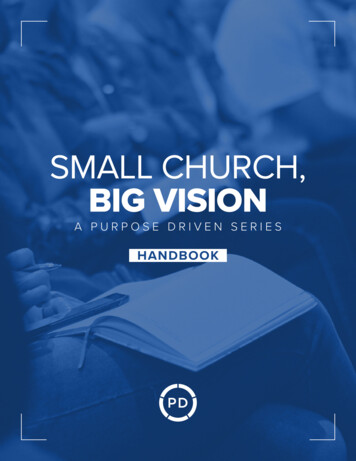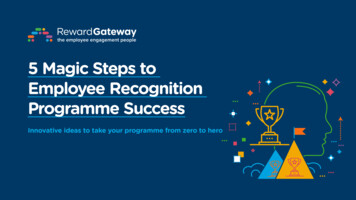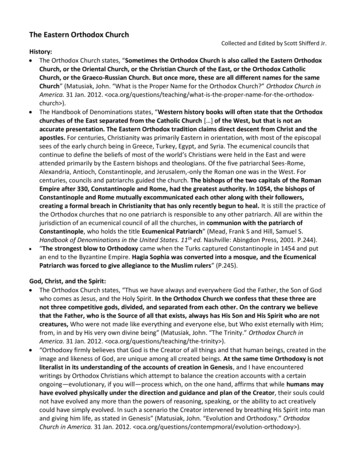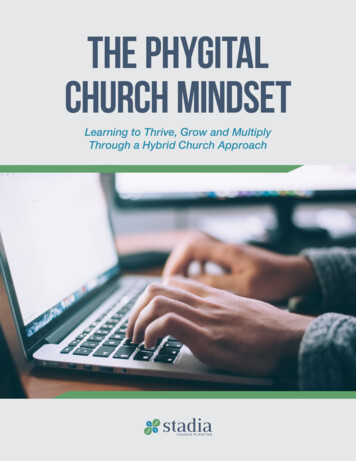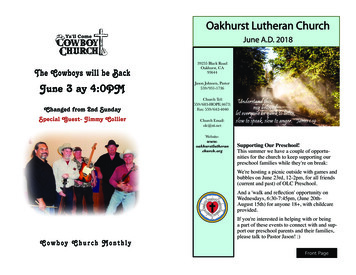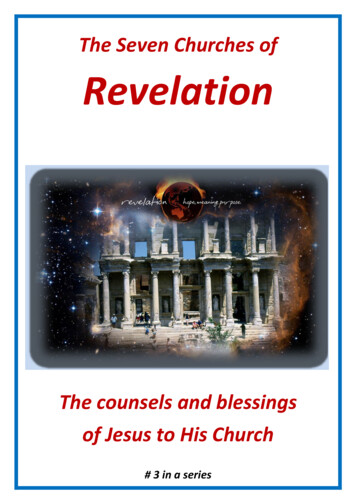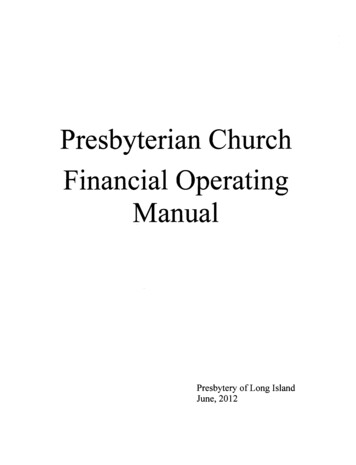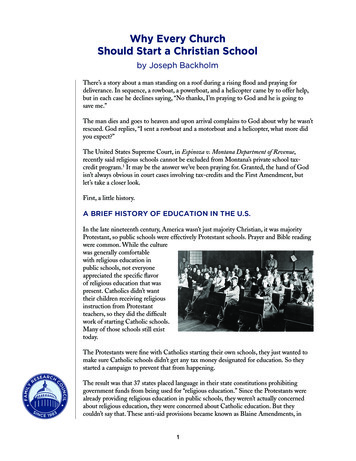
Transcription
Why Every ChurchShould Start a Christian Schoolby Joseph BackholmThere’s a story about a man standing on a roof during a rising flood and praying fordeliverance. In sequence, a rowboat, a powerboat, and a helicopter came by to offer help,but in each case he declines saying, “No thanks, I’m praying to God and he is going tosave me.”The man dies and goes to heaven and upon arrival complains to God about why he wasn’trescued. God replies, “I sent a rowboat and a motorboat and a helicopter, what more didyou expect?”The United States Supreme Court, in Espinoza v. Montana Department of Revenue,recently said religious schools cannot be excluded from Montana’s private school taxcredit program.1 It may be the answer we’ve been praying for. Granted, the hand of Godisn’t always obvious in court cases involving tax-credits and the First Amendment, butlet’s take a closer look.First, a little history.A BRIEF HISTORY OF EDUCATION IN THE U.S.In the late nineteenth century, America wasn’t just majority Christian, it was majorityProtestant, so public schools were effectively Protestant schools. Prayer and Bible readingwere common. While the culturewas generally comfortablewith religious education inpublic schools, not everyoneappreciated the specific flavorof religious education that waspresent. Catholics didn’t wanttheir children receiving religiousinstruction from Protestantteachers, so they did the difficultwork of starting Catholic schools.Many of those schools still existtoday.The Protestants were fine with Catholics starting their own schools, they just wanted tomake sure Catholic schools didn’t get any tax money designated for education. So theystarted a campaign to prevent that from happening.The result was that 37 states placed language in their state constitutions prohibitinggovernment funds from being used for “religious education.” Since the Protestants werealready providing religious education in public schools, they weren’t actually concernedabout religious education, they were concerned about Catholic education. But theycouldn’t say that. These anti-aid provisions became known as Blaine Amendments, in1
honor of a U.S. Representative from Maine named James Blaine who nearly succeeded inamending the U.S. Constitution with anti-aid language. Thank God he failed.In 1962, the Supreme Court said it was unconstitutional for teachers to lead theirchildren in prayer in their classroom. That decision was a small part of a broadersecularizing of schools and culture. Gradually, the secularists took the reins of publiceducation that had long been held, culturallyif not legally, by Christians. In this new world,the Blaine Amendment that had always beenintended to create a religious monopoly infavor of those in power, served the purposes ofthe humanists rather than the Protestants.Today, though 70percent of Americansclaim to be Christians,90 percent send theirkids to public schools.However, the Protestants did not respond asthe Catholics did to being outsiders. Despitelosing control of the education provided inpublic schools, Protestant Christians senttheir kids to the public schools anyway. Today,though 70 percent of Americans claim tobe Christians, 90 percent send their kids to public schools. 2 As it turns out, it has beenhaving an impact, and it’s not a good one.THE SECULARIZATION OF THE CHURCHAmerica is becoming less religious and has been for a while. In just the last decade, thenumber of people claiming to be Christian has declined 12 percent—from 77 percentto 65 percent. Not only is America less Christian as a percentage, the total number ofprofessing Christians has declined from 176 million in 2009 to 167 million in 2019, evenas the population increased by 23 million.3What should be more concerning to the church is the fact that those who claim to beChristian don’t actually believe Christian things anymore. Research by George Barnaestimates that only 17 percent of American Christians who consider their faith to beimportant and attend church regularly have a biblical worldview.4 Not only is Americabecoming less Christian, the church is as well. As the convictions of the church decline,the number of ex-Christians increases.The fastest growing religious category in America is the “nones”—those who claimto have no religion at all. Over the last decade, the number of Protestants declined 15percent and the number of Catholics declined 12 percent, while the “nones” grew 70percent—from 12 percent of the population to 17 percent in 2019.5 That’s an additional30 million people who now claim no religious faith. Of those, 78 percent grew up in thechurch.6 The church is losing its own kids.The reasons for this are undoubtedly complex, but some of it may not be that complex.Nearly 90 percent of children raised in Christian homes spend 30 to 35 hours a week inpublic schools typically run by people who do not espouse a biblical worldview. ThankGod for school leaders who do. Still, the goal of many parents is to keep children in asecular educational environment for 12 years until they are deemed academically ready to2
go to an institution of higher learning where the hostility to the faith of their parents islikely much more intense.As a result, many children from Christian homes are immersed in a culture whichteaches that male and female are social constructs, not biological realities. It teaches themthat good people believe marriage is a relationship between loving committed peopleregardless of their gender, and they desperatelywant to be seen as good people. We’ve taughtthem to want that. They are taught that all sexis good sex as long as everyone consents, thatabortion is an honorable choice, that people area threat to the planet, capitalism is evil, profitis greed, creation didn’t happen, and those whostarted our country should be subjects of scorn.Increasingly, they are taught that gratitude andforgiveness are tools of oppression while rage andbitterness are virtuous attempts to disrupt unjustpower structures.In an attempt to moderate the effects of whatthey’re taught in schools, mom and dad willtake their children to church on Sunday. Ifthey’re really serious, they’ll take them to a youth group on Wednesday also, but eventhat is happening less frequently than it once was. According to Pew, only 62 percent ofChristians—45 percent of Americans—attend church at least monthly.7 That numbershrinks to 35 percent for millennials. Thirty-seven percent of self-identified Christiansattend church somewhere between “never” and “a few times a year.”8Year after year, Christian children soak up attitudes, perspectives, and loves from anenvironment that we hope—in the best-case scenario—is neutral toward their faith.Unfortunately, neutrality doesn’t actually exist. When parents hope for neutrality, theyare hoping that their child’s educational environment will simply avoid any reference tofaith rather than mock or ridicule it. If that’s the best we can hope for, even the best-casescenario is bad. Teaching children knowledge of the world without reference to Godsimply communicates that God is not necessary to accurately understand the world—afoundational claim of secular humanism.A biblical understanding of life is that nothing can be accurately understood withoutfirst having an accurate understanding of God. “The fear of the Lord is the beginning ofknowledge ”9 “For in him all things were created: things in heaven and on earth, visibleand invisible, whether thrones or powers or rulers or authorities; all things have beencreated through him and for him.”10 If our hope is that our child’s education will simplyignore God, we shouldn’t be surprised when they form a view of the world that sees Godas largely irrelevant.To paraphrase Voddie Baucham, if we send our kids to be educated by Caesar, we have noright to be surprised if they act like Romans.The church, of course, is aware that young people are leaving, and many church leaders3
are humble enough to try to understand why. Sincere efforts at self-reflection have ledto a variety of conclusions, often informed by surveys of those who have left. “We’re toohypocritical. We’re not relatable enough. We’re trying too hard to be relatable. We talktoo much about politics. We don’t talk enough about social justice. We aren’t doing agood enough job answering hard questions. We’re too anti-science.”Largely missing is an assessment of why kids who grew up in the church think worshipstyles or human hypocrisy have anything to do with whether Jesus is Lord of all. TheNehemiah Institute annually administers the PEERS test among high school studentswhich seeks to identify a person’s worldview in five categories: Politics, Economics,Education, Religion, and Social Issues (PEERS). Each statement is framed to eitheragree or disagree with a biblical principle. Based on their responses, a student’s worldviewis placed in one of four categories: Biblical Theism, Moderate Christian, SecularHumanism, or Socialism.The 2015 test showed that 90 percent of students from Christian homes that attendedpublic schools score in a range that indicates their views are grounded in basic tenets ofsecularism.11The problem of young people walking away from their faith is not fundamentally aboutmusic styles, skinny jeans, or hymnals. The problem is that the education and formationof Christian kids has been outsourced to people outside the church. As a result, they havelearned to love the wrong things. The answer to that question can’t be fixed with a guitar,haircut, or new sermon series.This is why every church needs to start aChristian school. We don’t need to retreat fromthe world, we need to build the communitiesand institutions that allow the gospel to bethe most significant influence on our children.We have to stop outsourcing education. ManyChristian families send their children topublic schools in the hope that they will bemissionaries. To their credit, some studentshave done just that, but they are remarkablebecause they are the exception rather than therule. On balance, the culture is doing a muchbetter job of converting Christian kids thanChristian kids are doing of converting theirpeers, and it isn’t close.Almost half ofmillennial Christiansbelieve it is at leastsomewhat wrong toshare one’s personalbeliefs with someoneof a different faith.In fact, almost half of millennial Christians (47 percent) believe it is at least somewhatwrong to share one’s personal beliefs with someone of a different faith in the hopes ofconverting them.12 That would be “intolerant.”On some level, we understand why Christian families send their kids to public schools.They don’t want their kids in an environment that will kill their souls, they just feel likethey don’t have real options. Homeschooling is not possible for every family and privateschool is an additional expense.4
Which brings us back to Espinoza.In Espinoza, the Supreme Court said it is unconstitutional to exclude religious schoolsfrom school choice programs intended for private schools. In plain English, this means thatvouchers and tax-credits can now be used to send kids to Christian schools. This is new.For more than a century, state Blaine Amendments have forbidden this almosteverywhere, but the Supreme Court said it’s unconstitutional to exclude religious schoolsfrom these programs. The First Amendment does not forbid cooperation betweengovernments, it requires the government to treat all religious organizations equally.Today, 26 states have some form of voucher program, education savings accounts,individual tuition tax credits, scholarship tax credit programs, or special needs programthat allow parents to use education dollars at private schools.13 Most are limited in scopeand 24 states have no school choice options of any kind.The United States spends over 700billion a year on education, or 13,847 perstudent.14 The amount varies dramaticallyby state. New York spends over 23,000per student15 where Idaho spends theleast at 7,486 per student.16Wherever you live, that money is nowconstitutionally free to be used by schoolprograms to fund religious education asdirected by the parents, but it won’t happenautomatically. Two things have to happen first.State legislatures have to pass or expand school choicelaws and churches need to start enough schools so that there are real,quality alternatives for Christian families.The Espinoza decision does not move any child from a harmful school environment intoan ideal one. It does, however, give us a green light to do so if we’re willing to do thework. Here’s what needs to happen.1. CHURCHES MUST BEGIN WORKING WITH STATE ELECTEDOFFICIALS TO CREATE OR EXPAND SCHOOL CHOICEPROGRAMS.While the Supreme Court opened the door for religious schools to take advantage ofschool choice programs, it is state legislatures that determine whether school choiceprograms exist. The reason school choice programs don’t exist everywhere is because theyhave strong opposition from teachers unions. The open secret of education policy is thatthe priority of the education system is not education. The priority of the education system isteacher employment.In every market, we understand that competition improves quality. It’s true for technology,agriculture, health care, as well as education. The fact that Apple and Microsoft both exist5
makes both of them better companies and provides us with better products.Education is unique in its opposition to competition. Why? Money. Education policy isestablished by politicians who negotiate with teachers unions on things like teacher payand benefits. In addition, teachers unions in nearly every state have convinced politiciansto pass laws that require all teachers to give money to the teachers union in the form ofunion dues. In California alone, the teachersunion has 325,000 members that contribute 1,000 per year to the union. This means theunion brings in 325,000,000 annually to“advocate” for teachers.A significant part of their advocacy ispolitical work. This means that unions takethe money teachers had to give them anduse it to help the politicians who forced theteachers to give the money to the union. Ina different context this would be referredto as a kickback. The California TeachersAssociation currently has five active political action committees that plan to spend 35million in the 2020 elections.17 That number does not include direct contributions thatwill be made to individual candidates.Money not given to politicians or political campaigns is often spent trying to make lifedifficult for those who try to compete in the education market for education dollars.In 2019, the California Teachers Association spent 1 million lobbying the Californialegislature to crack down on charter school programs.In a nutshell, the architecture of public education operates this way. Politicians take taxdollars and give it to teachers who are legally obligated to give it to teachers unions whothen use that money to help the politicians stay in power. Anything that threatens to takemoney out of this system is opposed, regardless of how good it might be for education.Private and charter schools are a threat to this system because they threaten to employteachers who are not obligated to give money to teachers unions.If there is ever a conflict between what is good for teachers and what is good for thirdgraders, the teachers win every time. Third graders don’t vote and third graders don’t haveany money.None of this is to suggest that individual public school teachers are uninterested in theeducation of children. Most of them care very much and the vast majority are capableeducators. Many are as frustrated by the teachers union’s war on innovation as theparents are. Teachers are not the problem. The problem is a system that prioritizes theemployment of teachers over the education of children. But in most places, that is thereality. As a result, any attempt to give parents the authority to direct the education oftheir kids will be met with strong opposition.But it is absolutely a battle worth fighting because the stakes are nothing less than thesouls of our children and the soul of our nation.6
2. WE MUST START CHRISTIAN SCHOOLS.If the church is going to prevent the next generation of Christian kids from fallingaway in the same way the last generation of Christian kids did, we have to create theinfrastructure that will allow Christian kids to be formed in a different environment.We cannot offset 35 hours a week in a secular culture with 90 minutes on Sunday. Thechurch must end the habit of outsourcing the education of kids and once again becomethe greatest influence in the lives of our children.Not every church is big enough to sustain theirown Christian school, but every church is bigenough to be part of one. We need to buildcathedrals again. Not literally, though that maynot be a bad idea. We need to start buildingthings we will never see completed. We need todream generationally. We need to understand theworld we are living in is not the world we wereborn into. If we want things to be different inthe future than they are now, we have to behavedifferently than we have behaved in the past. If we want the next generation of Christiankids to love goodness, to hunger and thirst for righteousness, and stand courageouslyagainst the cultural tide, we have to stop looking to Caesar to educate them. We have todo that ourselves. We have to.We cannot offset35 hours a week ina secular culture with90 minutes on Sunday.Real education is too hard and too important to deceive ourselves into believing it canbe accomplished on Sunday morning and, maybe if we have time, Wednesday night.Our ambition needs to be much bigger than church attendance; we need to createan environment where Jesus can capture their hearts and become the object of theiraffections. Not simply their knowledge, their affections. For that to happen, they can’tsimply know about goodness, they have to absorb it. They should experience it throughhabits of prayer, song, and meditation that feed their souls. They should have front rowseats to the way these habits change the lives of those around them as well. This is howthey will learn to love the right things. But none of that will happen on accident.Our desires are the window to our loves. Many Christian kids simply aren’t aroundgoodness enough to develop an appetite for it, so their heart is captured by weakimitations.As C.S. Lewis wrote, “It would seemthat Our Lord finds our desires not toostrong, but too weak. We are half-heartedcreatures, fooling about with drink andsex and ambition when infinite joy isoffered us, like an ignorant child whowants to go on making mud pies in aslum because he cannot imagine what ismeant by the offer of a holiday at the sea.We are far too easily pleased.”7
That’s our problem and, with respect to our children, it’s also our fault. We have delegatedthe formation of our children’s hearts and failed to show them something aspirational tolove. Even when we are the primary influences in their life, this is difficult. If we aren’t,it’s nearly impossible. But now we have options.You can’t make a school magically appear overnight. It takes a plan and people with thepassion and knowledge to execute the plan. So, while you’re getting to know your statelegislators and organizing support for school choice programs, start a kindergarten. Makethe hearts of those kindergarteners the object of your passion. The year after that, youstart a first grade with a new class of kindergartners. Within a decade, maybe sooner, youhave a real school. Of course, it doesn’t guarantee the life-long discipleship of every childwho attends, but there’s no question that the odds will improve when the rhythm of theirlife is surrounded by people desiring goodness more than TikTok.We’re standing on the roof and the culture is drowning. We’ve prayed for an answer andsomething happened. God sends a global pandemic to completely disrupt the educationsystem and then opened the door for the church to once again lead in the education oftheir children—and use tax dollars to boot.Maybe you had a different solution in mind? One that required less effort? Keep praying,but it could be that the answer has already presented itself. This may be the time to startbuilding cathedrals again. Otherwise, we run the risk of getting to the other side andhearing God say, “what more did you expect?”Joseph Backholm is Senior Fellow for Biblical Worldview and Strategic Engagement at FamilyResearch Council.why every church should start a christian schoolby joseph backholm 2020 family research councilall rights reserved.printed in the united states8
Endnotes1. Espinoza v. Montana Department of Revenue, 591 U.S. 22 (2020), 5 g314.pdf.2. Grace Chen, “Public School vs. Private School,” Public School Review, April 5, 2019, accessed August5, 2020, ool-vs-private-school.3. “In U.S., Decline of Christianity Continues at Rapid Pace,” Pew Research Center, October 17, 2019,accessed July 21, 2020, -of-christianity-continues-at-rapid-pace/.4. “Competing Worldviews Influence Today’s Christians,” Barna, May 9, 2017, accessed July 21, dviews-influence-todays-christians/.5. “In U.S., Decline of Christianity Continues at Rapid Pace,” Pew Research Center.6. Dale Hudson, “5 Crucial Reasons Kids Leave Church When They Grow Up,” ChurchPlants, accessedJuly 21, 2020, reasons-kids-leave-church-grow.html.7. “In U.S., Decline of Christianity Continues at Rapid Pace,” Pew Research Center.8. Ibid.9. Proverbs 1:710. Colossians 1:1611. Lisa Becker, “Sending Christian Children to Public Schools: What the Results Show,” DayspringChristian Academy, January 23, 2018, accessed July 21, 2020, children-in-public-schools/.12. “Almost Half of Practicing Christian Millennials Say Evangelism Is Wrong,” Barna, February 5, 2019,accessed July 21, 2020, evangelism/.13. “Interactive Map,” American Federation for Children, accessed July 21, 2020, e-america/interactive-map/.14. “Fast Facts – Expenditures,” National Center for Education Statistics, accessed July 21, 2020, https://nces.ed.gov/fastfacts/display.asp?id 66; Mack DeGeurin, “The US spends more on education than anyother country, but students lag behind academically. Here’s how much other countries spend and howwell their students perform.,” Insider, August 22, 2019, accessed July 21, 2020, the-world-spend-on-education-2019-8.15. United States Census, “U.S. School Spending Per Pupil Increased for Fifth Consecutive Year, U.S.Census Bureau Reports,” press release, May 21, 2019, 9/school-spending.html.16. Kevin Richert, “Census Report: Idaho Ranks Next to Last In Per-Pupil Spending,” Idaho Ed News,May 21, 2019, accessed July 21, 2020, .17. Mike Antonucci, “California Teachers Association is flush with campaign cash to advocate for its 2020agenda,” LA School Report, September 18, 2019, accessed July 21, 2020, r-its-2020-agenda/9
Family Research Council’s mission is to advance faith, family, and freedom in public policy and theculture from a biblical worldview.Located in the heart of Washington, D.C., the headquarters of the Family Research Council providesits staff with strategic access to government decision-making centers, national media offices, andinformation sources.Founded in 1983, Family Research Council is a nonprofit research and educational organizationdedicated to articulating and advancing a family-centered philosophy of public life. In additionto providing policy research and analysis for the legislative, executive, and judicial branchesof the federal government, FRC seeks to inform the news media, the academic community,business leaders, and the general public about family issues that affect the nation.Family Research Council relies solely on the generosity of individuals, families, foundations, andbusinesses for financial support. The Internal Revenue Service recognizes FRC as a tax-exempt,501(c)(3) charitable organization. Donations to FRC are therefore tax-deductible in accordancewith Section 170 of the Internal Revenue Code.To see other FRC publications and to find out more about FRC’s work, visit frc.org.ADDITIONAL RESOURCES FROM FAMILY RESEARCH COUNCILWASHINGTON UPDATE wusubFamily Research Council’s flagship subscription: a daily email update with the latest pro-family take onWashington’s hottest issues. Subscribe at frc.org.TAKE ACTION ALERTScatsubAlerts notify you about opportunities to actively participate in Family Research Council efforts to uphold prolife, pro-family, and pro-freedom values in Washington. Subscribe at frc.org.FRCBLOG.COMFRC’s blog analyzes the most important news and issues at the forefront of the fight for religious liberty, theprotection of life at every stage, and the defense of marriage and the family, all from a biblical perspective.Don’t miss this daily source of in-depth analysis of the most fundamental issues that are shaping our nation’sfuture.Stay connected with FRC bysubscribing to our free services atfrc.org/connect , , , . . order line - - . Follow Us on Social Media!IF20H0110
Not only is America less Christian as a percentage, the total number of professing Christians has declined from 176 million in 2009 to 167 million in 2019, even as the population increased by 23 million.3 What should be more concerning to the church is the fact that those who claim to be Christian don't actually believe Christian things anymore.

